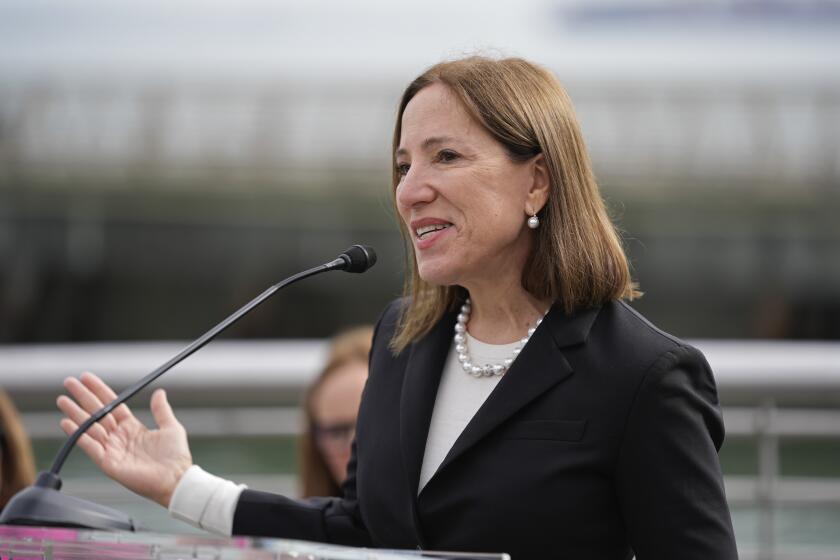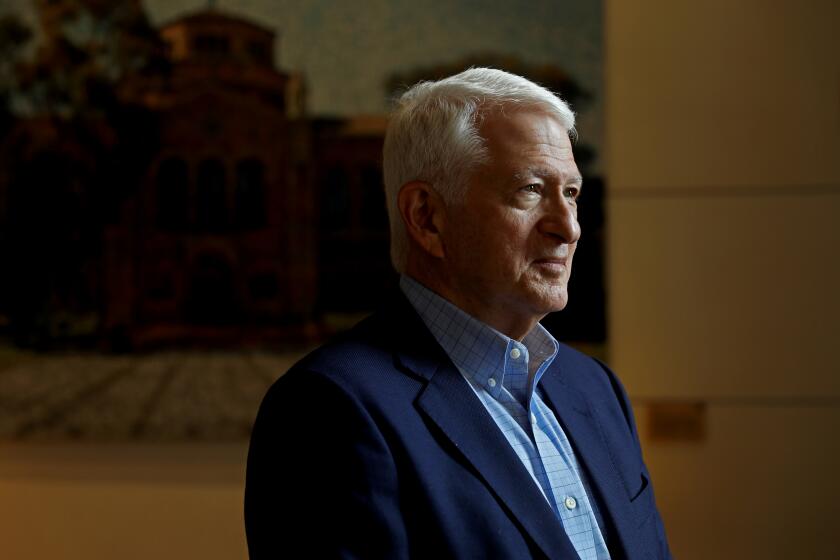Mayor Takes Aim at Cash-Rich Port With Brown’s Help : Government: O’Connor says Assembly speaker will push legislation to turn Port District over to city.
San Diego Mayor Maureen O’Connor on Tuesday said she has persuaded Assembly Speaker Willie Brown (D-San Francisco) to carry legislation allowing the cash-starved city to take control of the Port District--and its enviable $20-million reserve.
A spokesman for Brown confirmed that the politically powerful Democrat agreed to introduce such a bill soon to help San Diego and other San Diego Bay cities.
“His tone was fairly urgent,” said Jimmy Lewis, Brown’s press secretary.
O’Connor made her pitch to Brown during a day when she and other California mayors trekked to Sacramento to plead with Gov. Pete Wilson and legislative leaders not to balance the state’s deficit-plagued budget on the shoulders of municipalities.
The state faces a monumental $11-billion shortfall by 1993, and the mayors were the latest group to visit the Capitol to seek dispensation from the inevitable round of deep cuts necessary to balance the budget. School groups and mental health advocates already have said they could sustain no more cuts.
On Tuesday, the mayors met privately with Wilson for an hour and O’Connor said afterward that the former San Diego mayor showed sympathy for the plight of city leaders coping with hard times. O’Connor, who served as a city councilwoman under Wilson, lingered to speak personally with her former mentor after the other mayors filed out to hold a press conference.
Los Angeles Mayor Tom Bradley told reporters that he, O’Connor and the mayors of Oakland, Fresno, Sacramento, Sunnyvale, San Jose, San Francisco, Anaheim, Long Beach and Monrovia arranged their trip to the Capitol to plead for dispensation from the $11-billion shortfall.
He said cities have already taken significant financial hits in recent years requiring them to trim 3,200 employees statewide, reduce services, put a freeze on hiring and reduce the authorized slots for police officers. About 70% of them have raised taxes or fees, he said.
“There is a myth abroad in the state, especially here in Sacramento . . . that the cities are in Fat City and they don’t need any financial help (and) that we can take care of our problems by ourselves,” Bradley said.
“That’s simply not so and we tried to make that very clear.”
In San Diego, O’Connor said, Wilson’s proposed budget would require the city to forgo at least another $1 million in lost cigarette taxes. That comes on top of legislation, which still has the mayors upset, that permitted counties to start charging cities $100 million statewide for each prisoner booked into jail and for handling property assessments.
The result of such program shifts has translated this year into a prospective $40-million shortfall for the city of San Diego, O’Connor said.
Council members are trying to bridge the gap by making no new hires and negotiating with city employees to take a cut in their cost-of-living increases, she said.
But an obviously upbeat O’Connor said she’s willing to sustain even more budgetary hits this year if she can, in return, get legislation passed that would dissolve the San Diego Unified Port District and turn it over to San Diego and other coastal cities such as Imperial Beach and Coronado.
“For me, to get the port property within the city of San Diego’s jurisdiction and responsibility and authority, I will take a million or two hit this year to have that opportunity for the future,” O’Connor said.
The district would be a fiscal prize for the cities, since it runs Lindbergh Field and charges rents on harbor property. It has traditionally taken in millions of dollars more than it spends, and was able to build the $165-million Convention Center out of its reserves.
O’Connor, herself a former port commissioner, said the district has been slow to reimburse the city for police and fire protection, and has refused to lease the Lane Field property for $1 a year to the city for a new library, a pet project of the mayor’s.
O’Connor said she brought up the idea of dissolving the district and giving its responsibility--and money--to the city while meeting with Brown, who quickly agreed to sponsor legislation that would also benefit other port cities such as San Francisco and Long Beach.
O’Connor stressed that taking over the port is an old idea, one that was attempted unsuccessfully when Wilson was mayor and she was on the City Council.
“If they would give us more flexibility to manage our own assets within the city limits, we wouldn’t have to come up here” to seek state assistance, O’Connor said. “One of the assets is the port, and the Speaker has agreed to sponsor legislation to do just that.”
Dan Wilkens, a Port District spokesman, had no comment about Brown’s promise to carry the legislation. “Once we have a chance to take a look at the legislation, we’ll have something to say,” he said.
Wilkens said the Port District has about $25 million in reserves but may have to use $1.6 million of that to help pay for its proposed operating budget of $98.8 million.
During the press conference, neither O’Connor nor Bradley brought up the idea of dissolving the ports as a way for some California cities to make up for budgetary problems.
But the Los Angeles mayor stressed that other forms of local government--not cities--may have to raise taxes this year to make up for dwindling dollars in Sacramento. He stressed several times that only five of the state’s 58 counties raised taxes or fees last year.
“There needs to be a recognition that you can’t get it all out of the cities,” Bradley said. “If we have to pass new taxes, let’s all share in that. We took our step forward and faced up to the issue and we’re simply saying, ‘Let others now join us.’ ”
More to Read
Get the L.A. Times Politics newsletter
Deeply reported insights into legislation, politics and policy from Sacramento, Washington and beyond. In your inbox three times per week.
You may occasionally receive promotional content from the Los Angeles Times.






